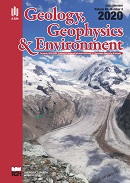Portable XRF spectrometer with helium flow as a tool for lithological interpretation
##plugins.themes.bootstrap3.article.main##
Keywords
Abstrakt
Portable EDXRF (Energy Dispersive X-Ray Fluorescence) spectrometer with the ability to perform rock tests in a helium atmosphere was applied to prepare unique calibration coefficients and mineralogical models. These data could be used for the chemical profiling, chemostratigraphy, gamma-ray, TOC and lithological interpretation of borehole geological profile. The measurements were conducted on 19 samples of sandstones and compared to the XRF data without helium flow. The acquired dataset was calibrated to the chemical laboratory tests (ICP-MS), gamma-ray spectrometry measurements (RT-50) and combined with the mineralogical data (XRD). The new methodology enables the measurement of sodium and enhances the possibility of detecting magnesium, thorium and uranium, compared to standard handheld XRF spectrometers. The applied method is dedicated to whole cores (without sample preparation) or cuttings which must be cleaned, dried, milled and pressed.
##plugins.generic.usageStats.downloads##
Bibliografia
Alnahwi A. & Loucks R.G., 2019. Mineralogical composition and total organic carbon quantification using x-ray fluorescence data from the Upper Cretaceous Eagle Ford Group in southern Texas. AAPG Bulletin, 103,12, 2891–2907.
Bruker Corporation, www.bruker.com [access: 1.12.2020].
Chao Y., Cancan Z., Feng Z., Song H. & Chaoliu L., 2015. A novel method for quantitative geosteering using azimuthal gamma-ray log. Applied Radiation and Isotopes, 96, 63–70.
Kowalska S., Kubik B., Skupio R. & Wolański K., 2018. Rekonstrukcja profilu litologicznego na podstawie wyników pomiarów składu chemicznego rdzeni wiertniczych i próbek okruchowych. [in:] Rozwój technik poszukiwania i eksploatacji złóż węglowodorów: Geopetrol 2018: materiały konferencyjne, Instytut Nafty i Gazu, Kraków, 115 –121.
Kozak M., 2010. Zastosowanie optycznej spektrometrii emisyjnej, ze wzbudzeniem w plazmie indukowanej w badaniach przetworów naftowych. Nafta-Gaz, 7, 606–612.
Liangquan G., Ye Z., Yeshun Ch. & Wangchang L., 1998. The Surface Geometrical Structure Effect in situ X-ray Fluorescence Analysis of Rocks. Applied Radiation and Isotopes, 49, 12, 1713–1720.
Loubser M. & Verryn S., 2008. Combining XRF and XRD analyses and sample preparation to solve mineralogical problems. South African Journal of Geology, 111, 2–3, 229–238.
Ogburn D., Sillar B. & Sierra J.C., 2012. Evaluating effects of chemical weathering and surface contamination on the in situ provenance analysis of building stones in the Cuzco region of Peru with portable XRF. Journal of Archaeological Science, 40, 4, 1823–1837.
Rowe H., Hughes N. & Robinson K., 2012. The quantification and application of handheld energy-dispersive x-ray fluorescence (ED-XRF) in mudrock chemostratigraphy and geochemistry. Chemical Geology, 324–325, 122–131.
Skupio R., 2014. Wykorzystanie przenośnego spektrometru XRF do pomiarów składu chemicznego skał. Nafta-Gaz, 11, 771–777.
Skupio R. & Dohnalik M., 2015. Improvement spectrometric gamma measurements on shale cores with the use of the BGO scintillation detector. Nafta-Gaz, 11, 847–855.
Skupio R. & Zagórska U., 2020. Kalibracja wyników analiz chemicznych piaskowców czerwonego spągowca wykonanych przenośnym spektrometrem XRF. Nafta-Gaz, 1, 12–17.
Yang Y., Sone H., Hows A. & Zoback M.D., 2013. Comparison of brittleness indices in organic-rich shale formations. [in:] 47th US Rock Mechanics / Geomechanics Symposium 2013. Vol. 2, American Rock Mechanics Association, 1398–1404.
Yasin Q., Du Q., Sohail G.M. & Ismail A., 2017. Impact of organic contents and brittleness indices to differentiate the brittle-ductile transitional zone in shale gas reservoir. Geoscience Journal, 21, 779–789.


